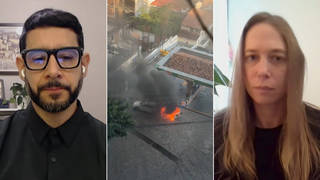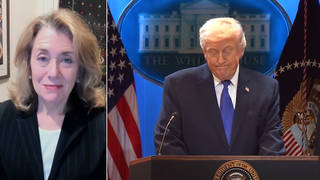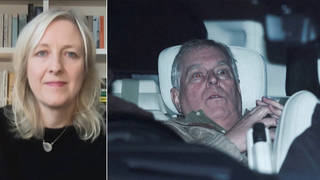
There are growing questions over the legality of U.S. strikes on suspected drug boats in the Caribbean. “These are sitting ducks, and we are simply engaged in cold-blooded murder of individuals who may or may not be drug smugglers,” says David Cole, professor at the Georgetown University Law Center. Cole says that President Trump is “committing homicide” by killing people without trial. “These individuals who have now been sent to the bottom of the sea by this president, if they were tried, at most, would face a sentence of some period of years,” says Cole. “There would be no death penalty authorized under the Constitution for these individuals, even assuming they’re guilty.”
This comes as Trump has authorized the CIA to carry out covert operations inside Venezuela aimed at regime change, raising fears of a military confrontation between the two countries.
Transcript
NERMEEN SHAIKH: This is Democracy Now!, democracynow.org, The War and Peace Report. I’m Nermeen Shaikh, with Amy Goodman in Santa Fe.
AMY GOODMAN: The Washington Post is reporting U.S. Special Operations helicopters and B-52 strategic bombers have been spotted flying less than 90 miles off the coast of Venezuela. Meanwhile, President Trump has authorized the CIA to carry out lethal covert operations inside Venezuela. The U.S. is also continuing to strike what they say are suspected drug boats in the Caribbean, despite growing questions over the legality of the strikes.
NERMEEN SHAIKH: In a stunning development, the U.S. admiral who commands military forces in Latin America, Alvin Holsey, is stepping down early from his post as head of U.S. Southern Command, reportedly because he had concerns about the U.S. attacking boats in the Caribbean. Holsey is the first African American commander of SOUTHCOM.
Earlier this week, President Trump was questioned by a reporter about U.S. military operations in the Caribbean.
REPORTER: Mr. President, on Venezuelans boats, I want to ask you: Why not have the Coast Guard stop them, which it is empowered by law to do? You know, this way, you can confirm who’s on the boat and ensure that they’re doing what they — what you suspect they’re doing.
PRESIDENT DONALD TRUMP: Because we’ve been doing that for 30 years, and it has been totally ineffective. They have faster boats. Some of these boats are seriously — I mean, they’re world-class speedboats, and — but they’re not faster than missiles. But we’ve been trying to do that for years, and so much of the drugs, 25, 30%, would come in through the seas.
REPORTER: What’s the next step in this war on cartels? And are you considering options — are you considering strikes on land?
PRESIDENT DONALD TRUMP: Well, I don’t want to tell you exactly, but we are certainly looking at land now, because we’ve got the sea very well under control.
NERMEEN SHAIKH: We’re joined now by David Cole, professor in law and public policy at the Georgetown University Law Center. He’s the former national legal director at the ACLU. His new piece in The New York Review of Books about Trump’s bombing of boats in the Caribbean is titled “Getting Away with Murder.”
Welcome back to the program, David Cole. If you could just start out by responding to these attacks and lay out your argument in The New York Review of Books piece, “Getting Away with Murder”?
DAVID COLE: Sure. You know, we have the power and the authority to make drug smuggling a crime. We have the power and the authority to interdict boats that are bringing drugs into this country. We have the power and the authority to try people. If they’re convicted by a jury, they can then be sentenced to a time of — a period of time in prison. What we do not have authority to do, what we do not have any legal authority to do, is to just execute people from the skies, without any evidence, without any trial, without any showing that they pose some sort of imminent danger to anybody.
And yet, that’s what President Trump is doing. He’s taken a metaphor, the “war on drugs,” and mistook it for an actual war, and is now engaged in premeditated execution of civilians. We’re not at war. No one even heard of this organization in Venezuela, Tren de Aragua, until President Trump declared that they were somehow attacking us, and justifying his use of military force. So, we’re not at war.
And even if we were at war, people on these boats are civilians. They are not attacking us. And under the international rules that govern armed conflict, you cannot target civilians unless they are actually engaged in hostilities against you, unless they are actually shooting against you. That is not what’s going on here. These are sitting ducks, and we are simply engaged in cold-blooded murder of individuals who may or may not be drug smugglers.
AMY GOODMAN: So, David Cole, you have actually Republicans, as well, who are condemning this, like Kentucky Republican Senator Rand Paul. And I want to ask: What if the situation were reversed? Right? What if a foreign country was targeting U.S. ships, saying, without giving evidence, that these were drug-smuggling ships and saying that their intelligence operations are now operating covertly in the United States? And there is, you know — and at least at this point, what, some 27 people have been killed. What do you feel U.S. — those in the United States can do to enforce the law? This is about the rule of law. It looks like Trump is imminently going to attack Venezuela. I don’t know if this is diverted tension from the possibility of the release of the Epstein files, but he has so upped the ante here.
DAVID COLE: No, absolutely. And, you know, there is a problem of drug smuggling across the Canadian border, from the United States to Canada. But does that give Canada the right to start executing Americans who it believes might be engaged in smuggling drugs? Absolutely not. And if Canada did that to Americans, we would be up in arms. We would be, essentially, treating that as an act of war, and an unprovoked act of war. So, this is — under domestic law, it’s murder. Under international law, it’s a war crime.
So, you know, it’s great that Rand Paul is standing up against it, but we should all be standing up against it. The notion that the president of the United States can order premeditated murder of individuals who do not pose any sort of threat, who are not shooting at us, are not attacking us, is completely outrageous. And, you know, what troubles me is that, by and large, it has barely caused a ripple. And a lot of things that Trump has done are deeply disturbing — weaponizing the Justice Department, pardoning the folks who were involved in January 6, cutting off aid to all kinds of needy people around the world and here at home. Those are outrageous. But there’s a difference when you start killing human beings without any process whatsoever.
You know, we have a death penalty in this country, but the death penalty can only be imposed, first of all, after a long and rigorous procedure to make sure that you haven’t gotten the wrong person. And secondly, it can only be imposed where the defendant is convicted of murder. These individuals who have now been sent to the bottom of the sea by this president, if they were tried, at most, would face a sentence of some period of years. There would be no death penalty authorized under the Constitution for these individuals, even assuming they’re guilty.
And yet, President Trump is just taking the law into his own hands, turning a metaphor into an actual war, and now suggesting that he’s going to authorize the CIA to use lethal force within Venezuela. It’s really just a completely outrageous action, and it’s very disturbing to me that there’s not more outrage within the Senate, within the House and within the American people.
NERMEEN SHAIKH: Well, David Cole, another issue, of course, that people have commented on extensively is that, first of all, Venezuela is neither the main producer nor exporter of drugs to the U.S., which has raised speculation about the motives of Trump targeting Venezuela rather than the countries who are either the biggest producers or exporters. What do you think explains that?
DAVID COLE: Yeah, no question, this is a political action by the president against Maduro, against a weak country that he can — he feels that he has the — you know, he’s a bully. He’s a bully at home. He’s a bully overseas. He feels that he can do this without significant pushback from Venezuela, and so he’s doing it. It is not about stopping drugs from coming into this country. Drugs continue to come into this country across the border every day in much larger amounts than come on speedboats from Venezuela. This is about his flexing muscle, acting the bully that he is.
But again, it is also about him committing homicide. There is a federal felony statute that makes it a crime to engage in homicide on the high seas. And that is what is happening.
The other thing I’ll say about it is it’s deeply concerning that the military is going along. You know, if this recent commander of SOUTHCOM stepped down because of concerns, that’s good. But what about all the other military people who are engaged in this action, which violates the most basic principles of the laws of war, which they are trained in and which they are obligated not to follow orders when they’re ordered to do something that is blatantly illegal?
AMY GOODMAN: David Cole, two quick final questions. One, isn’t the former Philippine President Duterte before the International Court on trial for doing exactly the same thing, murdering alleged drug traffickers?
DAVID COLE: Yeah, and President Trump has immunity from criminal prosecution in the United States because the Supreme Court gave it to him. He does not have immunity from international prosecution, and nor do those individuals who have participated in these murders. They can be tried in international tribunals, and they should be.
AMY GOODMAN: And finally, you have Pam Bondi, the chief enforcer of the law in this country, the U.S. attorney general — as we move into a segment now on “No Kings Day” — comparing how the U.S. is dealing with these so-called alleged drug traffickers, who they haven’t presented evidence of before they kill, to antifa, and saying that they are going to deal with antifa in exactly the same way. I mean, this is a key point, that they are going to take out antifa, as they’re bombing these boats and killing people. Your final comment, as a constitutional lawyer, on what this means, especially as we move into what could be the largest protest across the country in U.S. history?
DAVID COLE: Well, I think this is an opening wedge, right? You start by targeting the vulnerable. You start by acting overseas. You start by going after immigrants. And then you turn on your own people. And we’ve already seen him turning the military on his own people — in Los Angeles, in Washington, D.C., in Chicago, in Portland. He is turning the military on his own people. And the rationale that he offers for being permitted to kill people without any trial, without any process, on allegations, would — does not stop at the borders.
And when you have the attorney general suggesting that similar tactics are going to be used against our own people, that demonstrates the slippery slope that we are on. And I think, you know, the most important thing we can do in stopping that slippery slope is go out on No Kings Day, is show this president that we don’t want a president who kills illegally in our name.
NERMEEN SHAIKH: Well, thanks so much. David Cole, and we’re going to go to the No Kings protest after the break. David Cole, professor in law and public policy at Georgetown University Law Center and the former ACLU national legal director. We’ll link to your new piece in The New York Review of Books, “Getting Away with Murder.”
Next, we get an update on plans for the No Kings protests planned nationwide Saturday. Millions are expected to take to the streets for what could be one of the largest protests ever in the United States. Back in 20 seconds.
[break]
NERMEEN SHAIKH: “Massive Will,” Tunisian American Emel Mathlouthi performing in our Democracy Now! studio. Watch her full performance and interview at democracynow.org.












Media Options